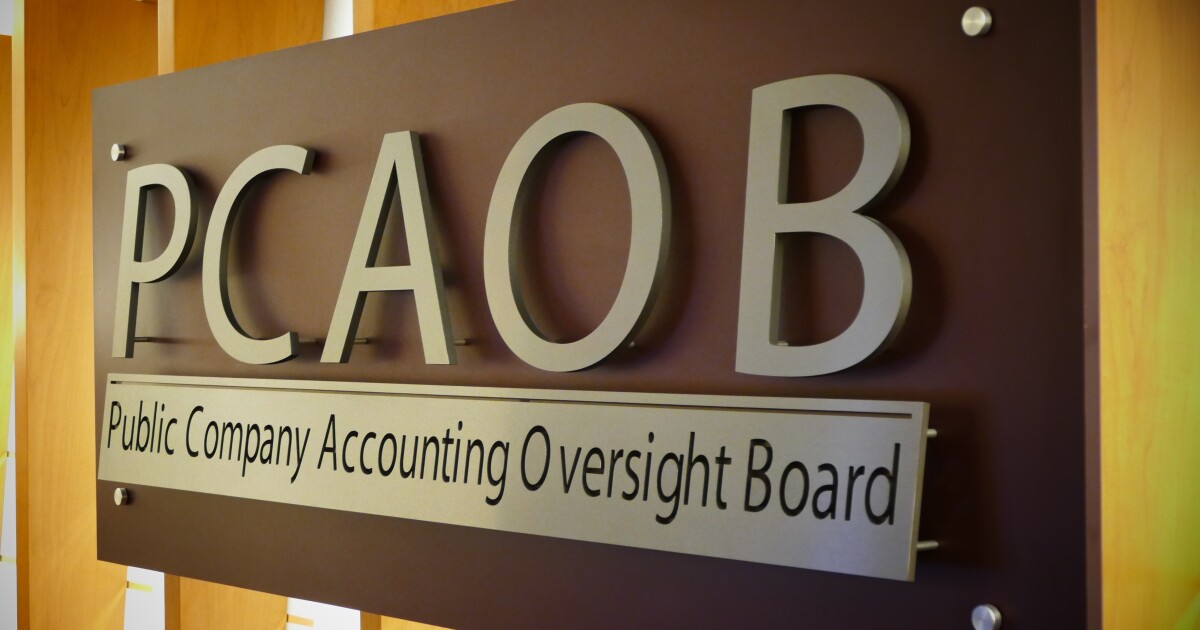High-profile enforcement activity is beginning to undermine the trust that the audit profession has earned over more than a century of diligent work. However, the historically large fines are not indicators of a degradation in audit quality. Instead, key audit quality indicators point to significant improvements in audit quality.
Recent enforcement actions by the Public Company Accounting Oversight Board appear to prioritize administrative burdens and punitive measures over substantive improvements in audit quality. As these multimillion-dollar fines make their way into headlines of mainstream news, the public perception of auditors and audit quality erodes.
Our profession supports the need to root out bad actors and poor quality, while ensuring the integrity of audits. However, the PCAOB’s current enforcement-first, overly prescriptive guidance leads to excessive administrative costs and enforcement measures that do little to enhance audit quality. Instead, this approach contributes to an atmosphere of hostility that forces staff and prospective auditors to think twice about their engagements and leadership roles in audit firms. This shift harms our profession — which is already struggling to attract and retain talent, even at the partner level — and also the broader capital markets.
Audit quality indicators already showed significant improvement before the PCAOB’s recent push for greater enforcement. For example, the Big Four audit firms have maintained relatively low deficiency rates, and the number of financial restatements has decreased dramatically in recent years. The percentage of material restatements, “Big R” restatements, fell from 28% to 18% from 2013 to 2022, reflecting better adaptation to new reporting standards and internal controls by public companies and their auditors, according to the Center of Audit Quality. While restatements ticked up slightly in 2021 due to financial statement reporting challenges resulting from COVID, in a more recent snapshot of our industry’s performance, the total number of restatements significantly decreased by 69% from 1,467 in 2021 to 454 in 2022.
Despite these gains, the PCAOB’s aggressive enforcement agenda overshadows the profession’s achievements. In the first half of 2024 alone, the PCAOB levied nearly $35 million in penalties — more than the combined total of penalties imposed in the previous four years. Just 10 years ago, the PCAOB levied fines totaling $85,000. In the span of a decade, that makes for an astonishing increase of over 40,000%. Prior to current PCAOB Chair Erica Williams, the average yearly fines from the board were approximately $2.6 million. From 2022 to the first half of 2024, the average annual total of fines sits at roughly $22 million.
This spike in fines reflects an ‘enforcement-first’ mentality that focuses on punishment rather than collaboration and guidance to improve quality.
Growing enforcement activity and eroded trust, despite improving audit quality
If we look more closely, many of these fines are imposed for technicalities, such as lapses in documentation, communication, or not filing a Form AP 60 in a timely fashion. Accounting firms should avoid these errors, yes, but the current regime punishes them with disproportionate severity.
Rather than providing firms an opportunity to remediate without financial penalties, the PCAOB’s aggressive actions discourage professionals from continuing in the auditing field, undermining the goal of promoting high audit quality. The effectiveness of the board’s regulatory oversight should be measured by improvements in audit quality, not the dollar figure it tallies in fines.
High-profile enforcement actions often overshadow the diligent, day-to-day work that most auditors perform, and these incidents do not reflect the overall health of the profession. Yet still, enforcement activity remains elevated.
Doing more with less: Guidance, technology and people
Since COVID, audit professionals are being asked to do more with less. More work, greater scrutiny, and harsher penalties exacerbate the profession’s talent pipeline challenges. Recent PCAOB proposals suggest a drastic expansion of audit scope — including the proposal on noncompliance with laws and regulations, for example, that would require auditors to provide greater assurance across areas typically outside the scope of a financial statement audit, which would result in significant increases in time and effort, and significantly increased audit fees.
While these regulations aim to increase trust and accountability, they can often create challenges for firms trying to comply. This is particularly true for smaller firms, which may struggle to meet new demands due to limited resources. Larger firms, while more equipped to adapt, must still weigh the balance of compliance against delivery of high-quality audits, and even some of the largest auditors have backed out due to the risk of over-zealous PCAOB enforcement.
Many firms see emerging technologies like artificial intelligence and automated analytics tools as a way to streamline processes and alleviate some aspects of increasing scrutiny and workloads. These innovations have the potential to revolutionize audits by automating data-heavy tasks and allowing auditors to focus on deeper, more complex analysis.
While the technology exists, many firms face challenges in integrating it at the speed and scale needed, in part due to a regulatory environment that pushes for enforcement instead of innovation. I believe that with a proper refocusing on progressive policy and support in regards to audit technology, we can create a framework that leads to fast adoption of technology to not only support auditors, but substantially improve audit quality.
A balanced approach to reform
Voices within the profession already call for a more sensible approach to reform. Christina Ho, a PCAOB board member, advocates for practical standards that enhance audit quality without imposing undue burdens on firms. These perspectives, echoed by the Pennsylvania Institute of CPAs, stress the importance of balancing improved processes with realistic operational expectations.
Moving forward, the audit profession must navigate the fine line between regulation, enforcement and innovation. If current regulatory pressures continue unchecked, they could drive professional talent away, threatening the diversity and competitiveness of the field. By supporting policies that prioritize both innovation and practicality, the audit profession can continue to thrive in a rapidly changing environment.


 Blog Post7 days ago
Blog Post7 days ago
 Economics1 week ago
Economics1 week ago
 Personal Finance1 week ago
Personal Finance1 week ago
 Finance1 week ago
Finance1 week ago
 Finance1 week ago
Finance1 week ago
 Accounting1 week ago
Accounting1 week ago
 Accounting1 week ago
Accounting1 week ago
 Accounting1 week ago
Accounting1 week ago













